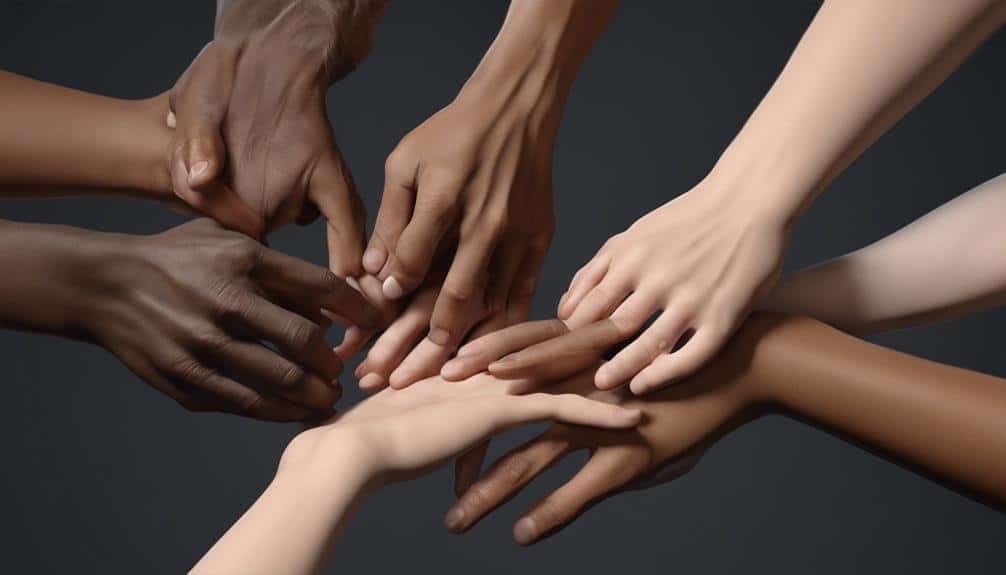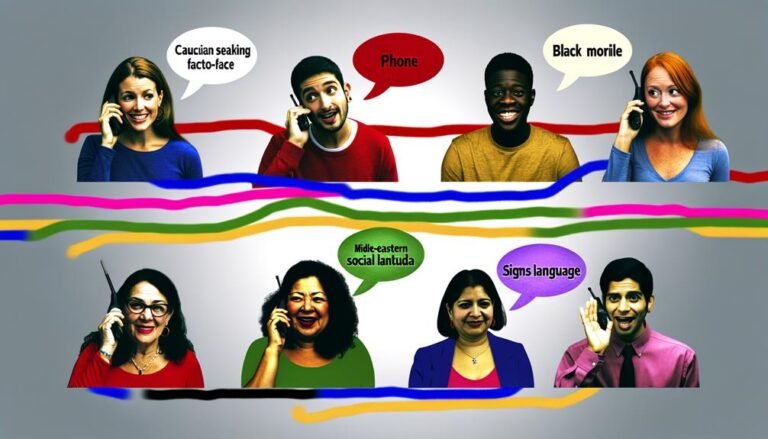Tolerance as a Soft Skill
In today's diverse world, mastering tolerance as an essential soft skill is vital. It helps build strong relationships, embrace inclusivity, and boost workplace efficiency. Tolerance fosters collaboration, enriches team dynamics, and fuels creativity. By valuing diverse perspectives, you create a positive environment that sparks innovation and enhances job satisfaction. Want to uncover more ways tolerance impacts various aspects of life?
Key Takeaways
- Tolerance enhances teamwork dynamics and productivity.
- Active listening and empathy are crucial in fostering tolerance.
- Cultural diversity enriches work environments.
- Tolerance encourages open communication and understanding.
- Inclusive environments promote creativity and innovation.
Importance of Tolerance
Understanding the significance of tolerance is essential in fostering harmonious relationships and promoting inclusivity within diverse communities. In the workplace, tolerance is crucial for productivity and teamwork. Cultural diversity brings a variety of perspectives, ideas, and approaches, enriching the work environment. Tolerance allows individuals to appreciate these differences, leading to a more cohesive and collaborative team dynamic.
Emotional intelligence plays a key role in practicing tolerance. It involves recognizing and managing one's emotions while understanding and empathizing with others. By developing emotional intelligence, individuals can navigate conflicts more effectively and approach diverse viewpoints with an open mind. Conflict management is another area where tolerance is invaluable. Respecting differing opinions and finding common ground are essential skills in resolving disputes peacefully.
Building Inclusive Environments
Fostering inclusivity within a workplace or community involves creating environments that embrace diversity and promote a sense of belonging for all individuals. To achieve this, it's important to focus on fostering belongingness and promoting harmony among all members. One key aspect is creating safe spaces where individuals feel comfortable expressing their thoughts, ideas, and identities without fear of judgment or discrimination. Encouraging understanding through open communication and active listening also plays a significant role in building inclusive environments.
When everyone feels valued and respected for who they are, it leads to a more cohesive and productive environment. Embracing differences and celebrating diversity can enhance creativity and innovation within the workplace or community. By actively working towards creating an inclusive environment, you contribute to a positive culture that benefits everyone involved. Remember, small acts of kindness and inclusivity can go a long way in making a significant impact on fostering a sense of belonging and promoting harmony among all individuals.
Enhancing Communication Skills
To enhance your communication skills, focus on active listening techniques, practicing empathy in conversations, and being mindful of nonverbal communication cues.
By actively listening to others, showing empathy, and being aware of nonverbal cues, you can improve your ability to connect and communicate effectively with those around you.
These skills are essential for fostering understanding, building strong relationships, and promoting a more inclusive environment.
Active Listening Techniques
Enhance your communication skills by implementing active listening techniques. Reflective listening and mindful communication are essential components of effective communication.
To practice reflective listening, focus on understanding the speaker's message and then restate it back to them to ensure you interpreted it correctly.
Mindful communication involves being fully present in the conversation, giving the speaker your undivided attention without distractions. Maintain eye contact, nod to show understanding, and ask clarifying questions when needed.
Avoid interrupting or formulating your response while the other person is speaking. By actively listening and engaging in mindful communication, you demonstrate respect and empathy towards others, fostering stronger and more meaningful connections in both personal and professional relationships.
Empathy in Conversations
Practice empathy in your conversations by actively listening and showing understanding towards others' perspectives. Engaging in empathy exercises can help you enhance your ability to connect with people on a deeper level.
When practicing compassionate communication, focus on acknowledging emotions, validating experiences, and demonstrating genuine concern. By actively listening to others without judgment and responding empathetically, you create a safe space for open dialogue and mutual respect.
Remember that empathy is a skill that can be developed through practice and self-awareness. By incorporating empathy into your conversations, you not only strengthen your relationships but also foster a more inclusive and understanding environment for everyone involved.
Nonverbal Communication Cues
Developing a keen awareness of nonverbal communication cues is essential for enhancing your communication skills effectively. Body language and facial expressions play a substantial role in conveying messages beyond words. Pay attention to gestures, posture, eye contact, and tone of voice to better understand the underlying emotions and intentions in a conversation.
For instance, crossed arms might indicate defensiveness, while a genuine smile can signify openness and friendliness. Being mindful of these nonverbal cues can help you adjust your own communication style and respond appropriately to others. Practice observing and interpreting nonverbal signals in different contexts to improve your overall communication effectiveness.
Tolerance in Teamwork
When working in a team, practicing tolerance is essential for fostering a harmonious environment.
Respect in collaboration involves acknowledging the diverse perspectives and ideas that each team member brings to the table.
Conflict resolution strategies play a key role in maintaining productive teamwork when differences arise.
Respect in Collaboration
Promoting mutual respect is essential for fostering effective collaboration within a team, highlighting the significance of tolerance in teamwork. Respect forms the foundation of cooperation, allowing team members to appreciate each other's perspectives and contributions.
When team members treat one another with respect, it creates a vital and inclusive environment where everyone feels valued. Respect in collaboration also involves actively listening to others, acknowledging their ideas, and providing constructive feedback.
Diversity in Perspectives
Embracing diverse perspectives within a team fosters a culture of openness and innovation, emphasizing the importance of tolerance in collaborative efforts. By acknowledging cultural differences and seeking to understand varying viewpoints, teams can leverage a wide range of experiences and insights.
Open-mindedness and pivotal play vital roles in creating an environment where every team member feels valued and respected. This acceptance of diverse perspectives not only enriches the team dynamic but also leads to more creative problem-solving and decision-making processes.
When individuals approach teamwork with a willingness to learn from one another, it paves the way for increased productivity and a stronger sense of unity within the team.
Conflict Resolution Strategies
Utilize effective communication techniques to navigate conflicts within your team, fostering a culture of tolerance and understanding. When conflicts arise, consider employing mediation techniques to facilitate open dialogue and mutual understanding among team members. Mediation involves a pivotal third party guiding the discussion towards a resolution that satisfies all parties involved.
Additionally, conflict de-escalation strategies can be vital in diffusing tense situations before they escalate further. Techniques such as active listening, staying calm, and reframing issues can help in calming emotions and promoting rational discussions.
Tolerance and Creativity
Tolerance plays an essential role in fostering a climate where creativity can flourish. When individuals feel accepted and respected for their diverse perspectives, they are more likely to think outside the box and contribute innovative ideas. Creativity thrives in environments where different viewpoints are not only tolerated but embraced, leading to a rich tapestry of thoughts and solutions.
| Benefits of Tolerance in Fostering Creativity |
|---|
| 1. Encourages diverse perspectives |
| 2. Sparks innovation through varied ideas |
| 3. Fosters an environment of acceptance |
Impact on Workplace Satisfaction
Tolerant workplace environments have a significant impact on employee satisfaction levels. When individuals feel accepted and respected for who they are, it positively influences their overall job satisfaction and commitment to the organization. Workplace culture plays a vital role in shaping employees' experiences, affecting their sense of belonging and engagement. Team dynamics also benefit from tolerance, as it fosters open communication, collaboration, and a sense of unity among team members.
Employee retention rates tend to be higher in environments where tolerance is practiced and valued. When employees feel supported and included, they're more likely to stay with the company long-term. Job satisfaction increases as individuals feel comfortable expressing their opinions and being themselves without fear of judgment or discrimination. This leads to a more harmonious work environment where productivity and morale are high.
Strategies for Developing Tolerance
To enhance the culture of acceptance and respect in the workplace, consider implementing practical strategies that promote inclusivity and understanding among team members. Essential resolution plays a vital role in fostering tolerance within a team. Encourage open communication channels where team members feel safe to express their thoughts and feelings. Provide essential resolution training to equip employees with the necessary skills to address and resolve disagreements peacefully.
Cultural understanding is another key aspect of developing tolerance. Organize cultural awareness workshops or training sessions to educate employees about different cultural norms, beliefs, and practices. Encourage team members to share their own cultural backgrounds and experiences to promote empathy and understanding.
Promote teamwork through collaborative projects that require diverse perspectives and skills. Encourage team-building activities that help foster relationships and trust among team members. Celebrate diversity by acknowledging and appreciating the unique qualities and contributions of each team member.
Conclusion
In summary, tolerance isn't just a valuable trait, but a vital soft skill that can greatly impact workplace dynamics. Research has shown that teams with high levels of tolerance are more innovative, productive, and satisfied.
By fostering a culture of inclusivity and open communication, individuals can develop their tolerance and contribute to a more harmonious work environment.
So, next time you encounter a challenging situation, remember the power of tolerance in shaping positive outcomes.








